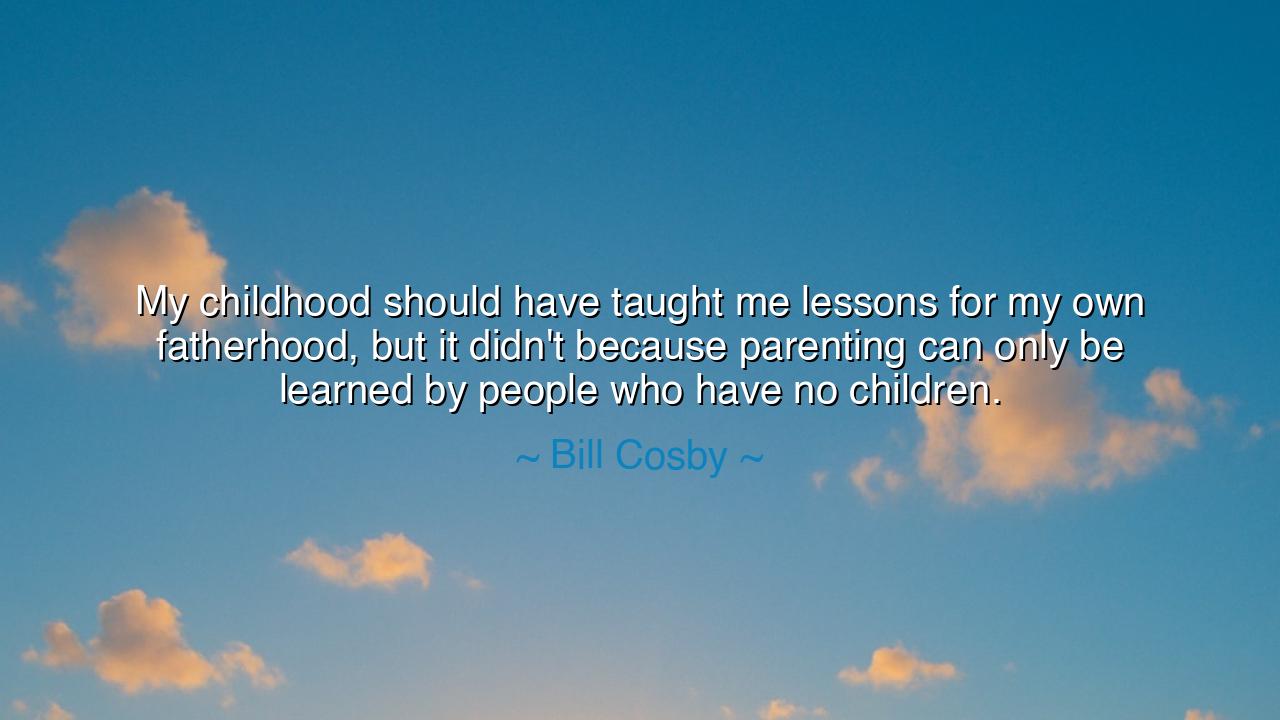
My childhood should have taught me lessons for my own
My childhood should have taught me lessons for my own fatherhood, but it didn't because parenting can only be learned by people who have no children.






In the words of Bill Cosby, there is a paradox both humorous and profound: “My childhood should have taught me lessons for my own fatherhood, but it didn’t because parenting can only be learned by people who have no children.” Here lies a truth that has echoed through generations—that no amount of memory, observation, or secondhand wisdom can fully prepare a soul for the crucible of raising another life. We may think we are armed with the examples of our parents, whether their guidance was gentle or harsh, but once we step into the role of fatherhood or motherhood, we find ourselves novices again, students in the school of life.
The ancients spoke of this same riddle. Socrates, who claimed that wisdom began in knowing one’s ignorance, might have smiled at Cosby’s words. For what is parenting, if not the daily revelation of one’s limits, the humbling discovery that every child is a world unto themselves? Just as no two rivers flow the same path, no two children demand the same care. Thus, Cosby’s statement becomes less a jest and more a confession: the art of raising children is learned only by those thrust into its practice, never by those who merely imagine it.
History gives us many examples. Marcus Aurelius, emperor and philosopher, wrote his Meditations as a guide to virtue, yet even he struggled with the task of fatherhood. His son, Commodus, grew cruel and reckless, remembered as one of Rome’s most disastrous rulers. Marcus’s wisdom as a philosopher could not ensure his success as a parent, for the child’s heart is not shaped by writings alone but by the living presence of guidance, discipline, and love. This story echoes the truth Cosby highlights: fatherhood is not inherited knowledge—it is a living labor that must be discovered anew.
Cosby’s words also remind us of humility. Too often, those without children imagine they know how to raise them: they offer advice, judge decisions, and imagine themselves wise. But the moment one becomes a parent, certainty vanishes. Sleepless nights, unending questions, the child’s unpredictable spirit—all strip away the illusions of mastery. This is why parenting is best understood not as a science of rules, but as a craft of endurance, patience, and love, learned only through practice.
The meaning, then, is that childhood may shape us, but it cannot entirely prepare us. We may vow never to repeat the mistakes of our parents, or we may dream of imitating their virtues. Yet when the hour comes, we discover that our own children awaken challenges we never foresaw, and our own hearts reveal weaknesses we never knew. This is the “tragedy and comedy” of parenthood: that we are always beginners, even as we hold the most important responsibility of all.
The lesson for us is clear. First, let us walk into parenting with humility, acknowledging that we will stumble, that we will blunder, but that love can redeem our failings. Second, let us avoid judgment toward others, knowing that every child presents unique challenges invisible to outsiders. Third, let us embrace the lifelong learning of parenthood, for to raise a child is not to master a craft once and for all, but to grow daily alongside them.
O seekers of wisdom, remember this: to be a parent is to enter a path where knowledge cannot precede experience. You cannot master the art before you begin it. You learn as you walk, and you grow as you guide. This is the humility of fatherhood, the sacrifice of motherhood, and the eternal challenge of love.
Thus, Cosby’s words, though spoken with irony, point us toward a truth of lasting weight. Parenting is not inherited like wealth, nor memorized like a lesson—it is lived. It humbles the proud, reshapes the wise, and teaches that the greatest education comes not from what we already know, but from what we dare to learn in the face of love’s demands.






AAdministratorAdministrator
Welcome, honored guests. Please leave a comment, we will respond soon